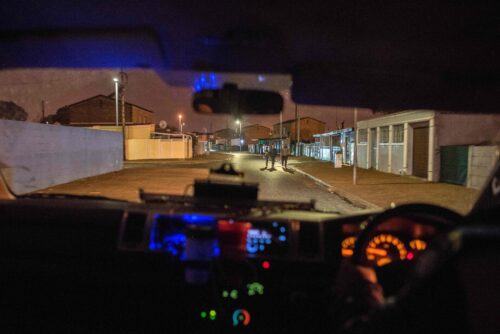How Rumors Tap and Fuel Anxieties in the Internet Age
I sometimes like to joke that anthropologists looking for the strangest and most exotic society on earth should do fieldwork in the United States. As if to prove my point, along comes Pizzagate.
“Pizzagate” is the moniker being used to describe the bizarre set of rumors, spread by right-wing fake-news sites and conspiracy theorists, that Comet Ping Pong, a popular pizza restaurant in Washington, D.C., is a key location in a child slavery and sex trafficking ring run by Hillary Clinton. The rumor that Hillary Clinton was at the center of a pedophilia ring originated with an October 30 tweet, retweeted more than 6,000 times, from @DavidGoldbergNY. The rumor spread from there on social media platforms such as 4chan and Reddit and was further disseminated by right-wing propagandist Alex Jones, who runs the Infowars website that is influential among right-wing conspiracy theorists. “I think about all the children Hillary Clinton has personally murdered and chopped up and raped,” said Jones, in a YouTube video that has been watched more than 400,000 times. “Yeah, you heard me right. Hillary Clinton has personally murdered children. I just can’t hold back the truth anymore.”
When the email account of John Podesta, Hillary Clinton’s campaign chair, was hacked, revealing that he sometimes ate at Comet Ping Pong, the modest Washington eatery (where my kids like to eat because it has table tennis and an excellent margherita pizza) became the supposed center (complete with concealed underground tunnels) of Hillary’s child sex ring. As bots (automated internet programs, in this case written by Russian agents, according to some) amplified the rumor, which was also spread by Donald Trump’s national security advisor, threats began pouring in not only to Comet Ping Pong but to neighboring restaurants and stores too. For example, according to The Washington Post, someone told the owner of nearby Besta Pizza that the slice of pizza on his logo was a secret child-pornography symbol, and when he took the image off his website to defuse the controversy, antagonists crowed that this was an admission of guilt.
Events took an even more malevolent turn on December 4, when 28-year-old Edgar Welch drove from North Carolina with an assault weapon to “self-investigate” the rumors. He fired his gun inside the restaurant but, mercifully, no one was hurt, and he was taken into police custody.
Media coverage of Pizzagate has drawn attention to the damage that fake news can do to the fabric of democracy (for instance, the abundance of fake news shared on social media leading up to the election is thought to have potentially influenced the outcome of the election). It also can create an alternate reality that deepens political divisions while inciting the mentally unstable (case in point: Pizzagate). The extensive coverage of the fake-news phenomenon emphasizes the unprecedented nature of the situation.
But to me, as an anthropologist, the Pizzagate rumor has a familiar feel. Scholars have documented a plethora of inaccurate but stubbornly powerful rumors in societies all over the world. In her book on international adoption, historian Karen Dubinsky writes about rumors circulating in Guatemala that foreigners abduct local children and turn them into sex slaves or steal their organs. Illustrating the power such falsehoods can have, tourists have been lynched as a result of the accusations.
Anthropologist Nancy Scheper-Hughes found similar rumors about people being murdered for their organs in Brazil. Anthropologists Eirik Saethre and Jonathan Stadler map rumors in South Africa that whites kill volunteers in clinical trials and steal their blood. And anthropologist Karen Kroeger writes about widespread stories in Indonesia of people in crowded malls and elevators being stuck with a needle and left with a card saying, “Welcome to the AIDS Club.” (She also notes, in passing, rumors in Borneo that missionaries chop off children’s heads and use them as building materials). Recently, polio vaccination campaigns in Pakistan have faltered in the face of rumors that the vaccine is an American conspiracy to sterilize Muslims, and health workers on the frontline of the vaccination campaign have even been killed.
Noting that “rumors often circulate most intensively at times of uncertainty or unrest,” Kroeger writes that “rumors are more than just wrong or incomplete information; they are … a reflection of beliefs and views about how the world works in a particular place and time.” In other words, they may be literally wrong, but they express, metaphorically at least, a deeper perceptual truth. One might add that this deeper perceptual truth is often a reaction to felt abuses and injustices. Americans may not abduct Guatemalan babies and harvest their organs, but foreign adoptions of Guatemalan babies have been rife with exploitation. Doctors may not murder African subjects in clinical trials, but Western pharmaceutical companies and research institutions have used Africans as human subjects in trials that would not have been allowed in the U.S. And while the polio vaccine may not be part of an American plot to sterilize Muslims in Pakistan, the CIA did orchestrate a door-to-door vaccination campaign in Pakistan to collect DNA and thus confirm the whereabouts of Osama bin Laden prior to killing him.
So where does this leave us with the child-sex-slave ring at Comet Ping Pong? To what anxieties and resentments do the false rumors speak?
For one, the rumors dramatize a perception among some that Hillary Clinton and her party’s establishment are untrustworthy, compassionless, and exploitative. The location of the alleged child sex ring—in Washington, D.C.—speaks volumes about the way many Americans feel about the political culture of the nation’s capital. The centrality of child sex slaves in the story signals anxieties about the sexualization of children in the U.S. and, more broadly, fears about the security and well-being of the next generation of Americans. Hillary Clinton may not be holding children as slaves in tunnels, but some critics believe her party has presided over a process of deindustrialization that undermines the next generation’s future.
Finally, skepticism about the mainstream media’s debunking of the rumors speaks to a widespread loss of confidence in establishment authorities. In an email to The Washington Post, the owner of 4chan wrote, “Pizzagate reminds me that a country indicated [there were] stockpiles of weapons of mass destruction in Iraq and many people and countries were deceived. It is same old story.” Some have even claimed that Edgar Welch’s armed expedition to Comet Ping Pong and his failure to find any child sex slaves there were a “false flag”—an operation to cover up the conspiracy.
Rumors of organ theft in Guatemala or the “AIDS Club” in Indonesia were spread primarily by word of mouth; in Pakistan, radical Islamist preachers played a key role in disseminating rumors about the polio vaccination campaign. But now we have the internet—a perfect environment for the incubation and rapid dissemination of such rumors. As we are seeing, the internet is changing the balance of forces between mainstream media—with its (admittedly imperfect) protocols for systematically investigating stories—and “prosumers” (consumers who are now also producing influential “news” stories).
Pizzagate is a harbinger of much worse to come.



























